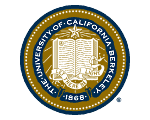Garret Kenyon
Los Alamos National Laboratory
A Deconvolutional Competitive Algorithm (DCA)
Friday 30th of October 2015 at 11:00am
560 Evans
The Locally Competitive Algorithm (LCA) is a neurally-plausible sparse solver based on lateral inhibition between leaky integrator neurons. LCA accounts for many linear and nonlinear response properties of V1 simple cells, including end-stopping and contrast-invariant orientation tuning. Here, we describe a convolutional implementation of LCA in which a column of feature vectors is replicated with a stride that is much smaller than the diameter of the corresponding kernels, allowing the construction of dictionaries that are many times more overcomplete than without replication. Using a local Hebbian rule that minimizes sparse reconstruction error, we are able to learn representations from unlabeled imagery, including monocular and stereo video streams, that in some cases support near state-of-the-art performance on object detection, action classification and depth estimation tasks, with a simple linear classifier. We further describe a scalable approach to building a hierarchy of convolutional LCA layers, which we call a Deconvolutional Competitive Algorithm (DCA). All layers in a DCA are trained simultaneously and all layers contribute to a single image reconstruction, with each layer deconvolving its representation through all lower layers back to the image plane. We show that a 3-layer DCA trained on short video clips obtained from hand-held cameras exhibits a clear segregation of image content, with features in the top layer reconstructing large-scale structures while features in the middle and bottom layers reconstruct progressively finer details. Lastly, we describe PetaVision, an open source, cloud-friendly, high-performance neural simulation toolbox that was used to perform the numerical studies presented here.(video)
Join Email List
You can subscribe to our weekly seminar email list by sending an email to
majordomo@lists.berkeley.edu that contains the words
subscribe redwood in the body of the message.
(Note: The subject line can be arbitrary and will be ignored)

